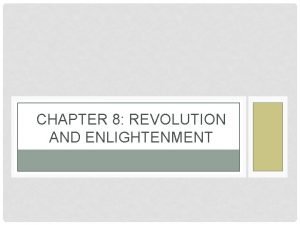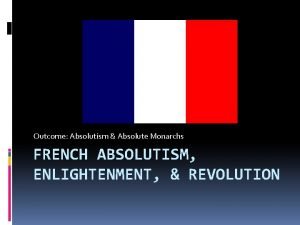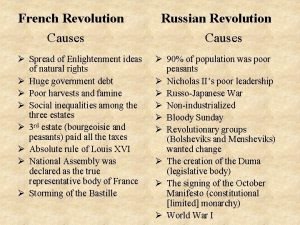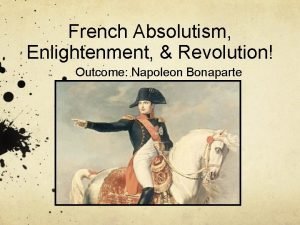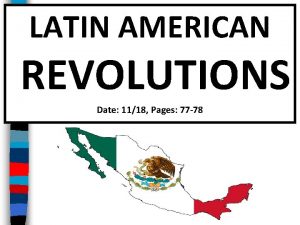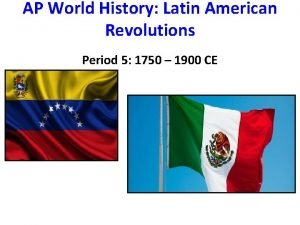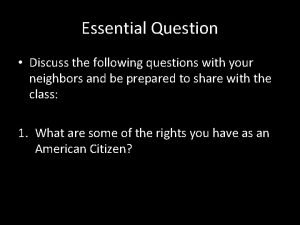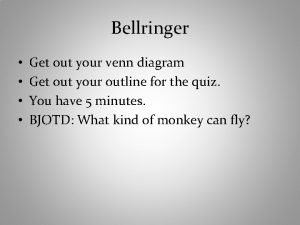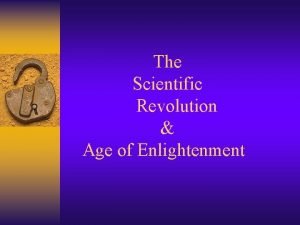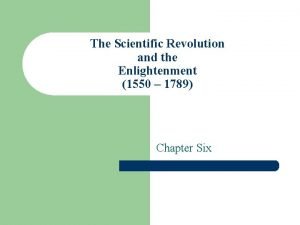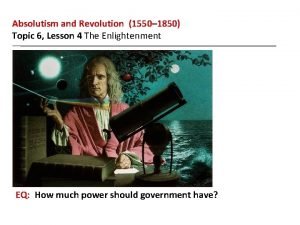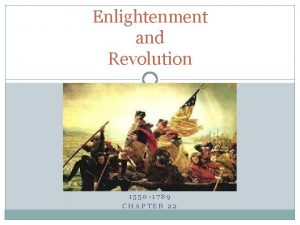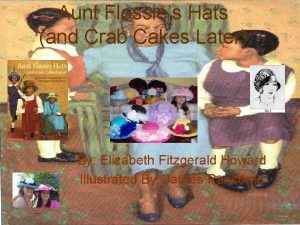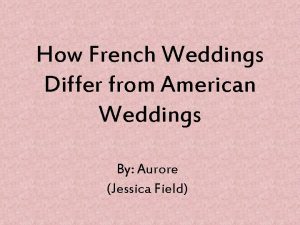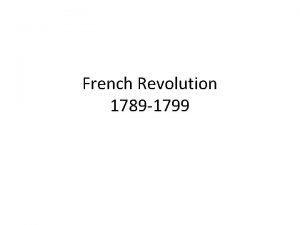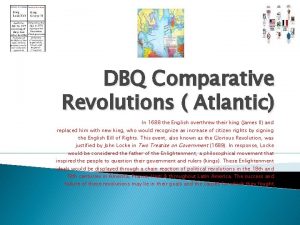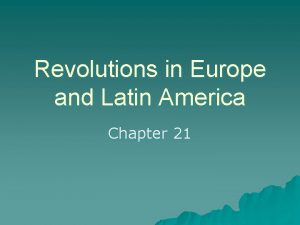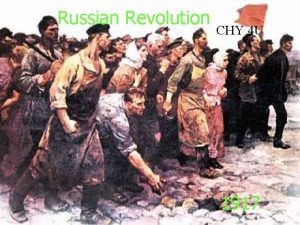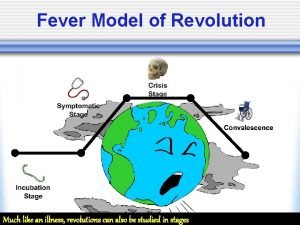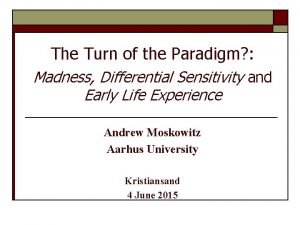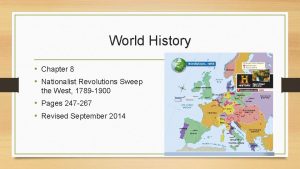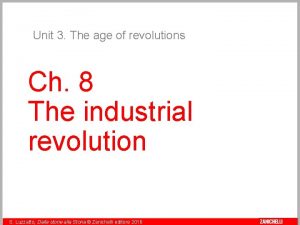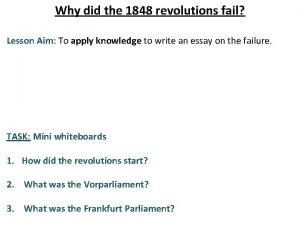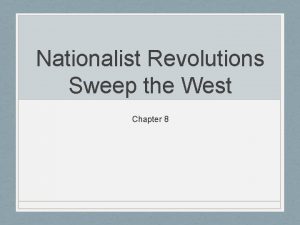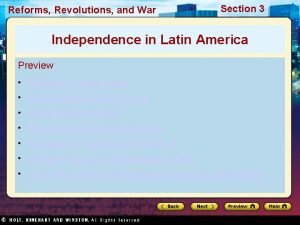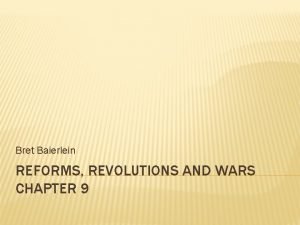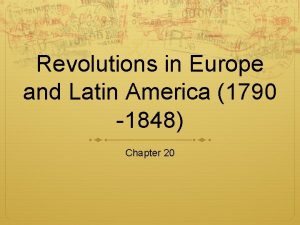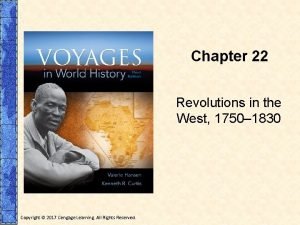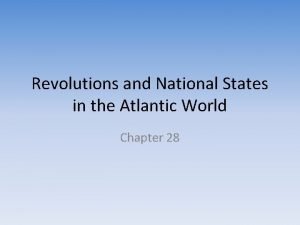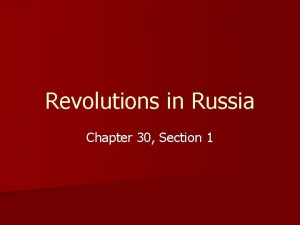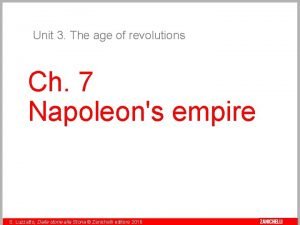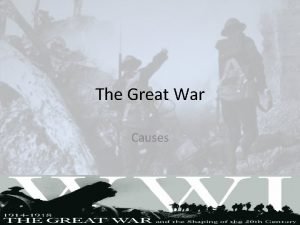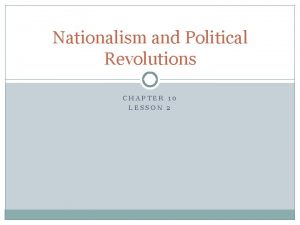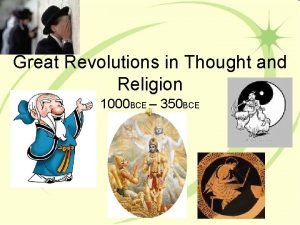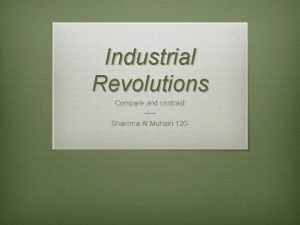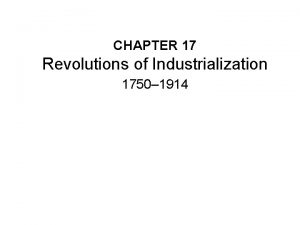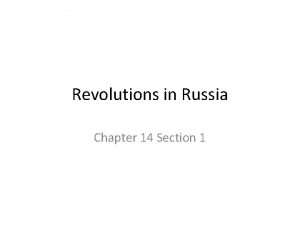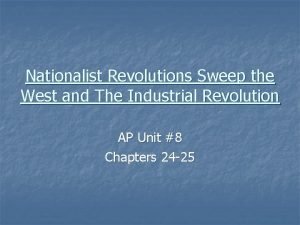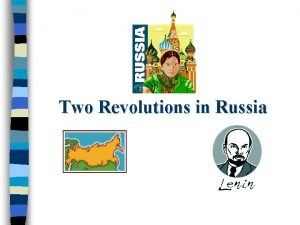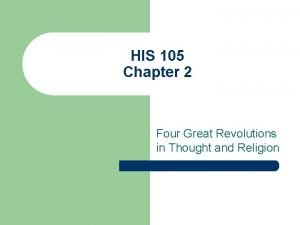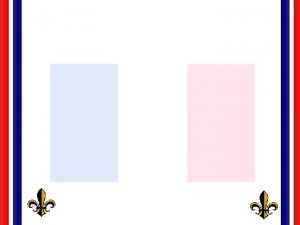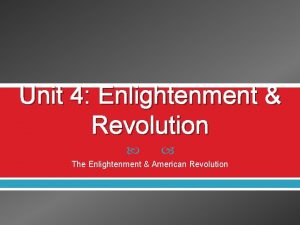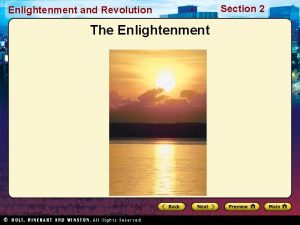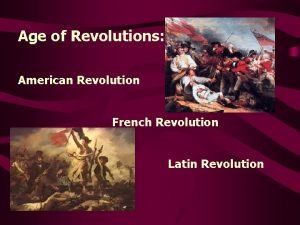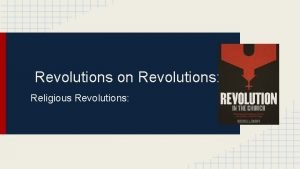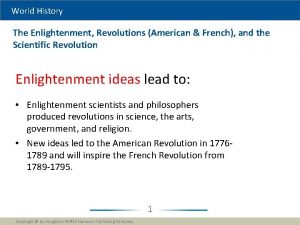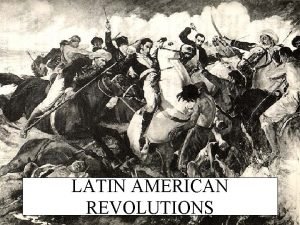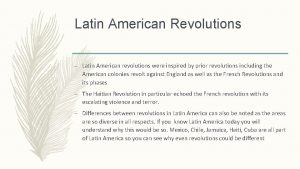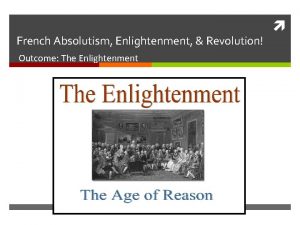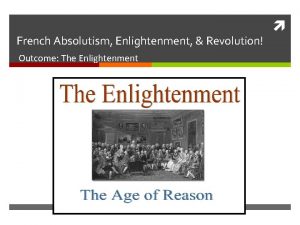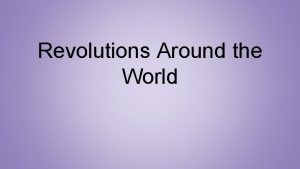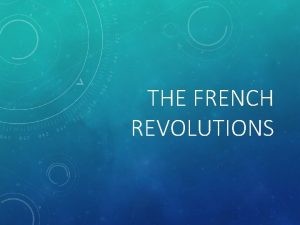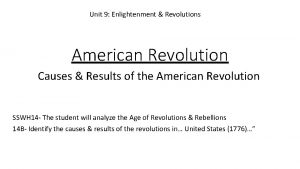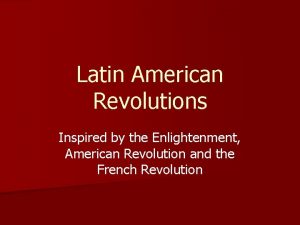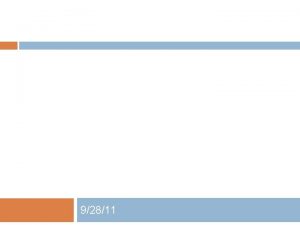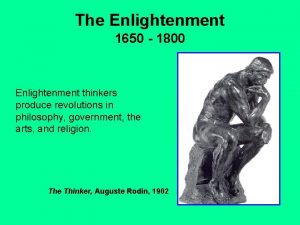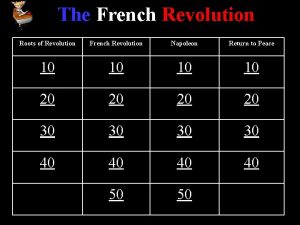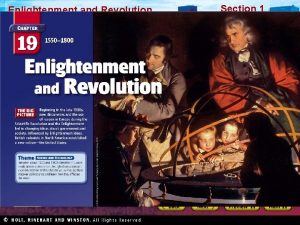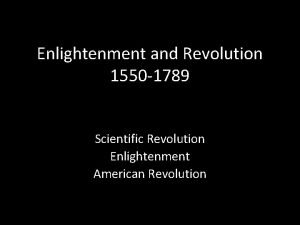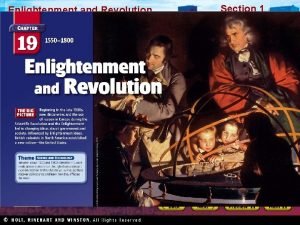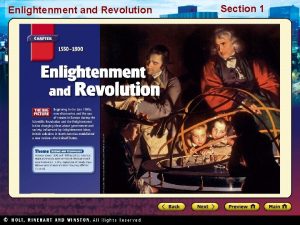REVOLUTIONS 17 Enlightenment American Revolution 18 French Revolution
















































- Slides: 48

REVOLUTIONS 17: Enlightenment & American Revolution 18: French Revolution & Napoleon 19: Europe & Latin American Revolutions

Enlightenment ¡ Natural Rights: rights that belonged to humans from birth (life, liberty, property) l Government shouldn’t violate l Against monarchy ¡ Great Writers: l Thomas Hobbes: people are selfish, need monarchy l Montesquieu: 3 branches of government to divide power l Voltaire: no slave trade, inequality l Diderot: against monarchy l Rosseau: minimal government

Enlightenment ¡ ¡ Debate about women’s rights Laissez faire: l l l ¡ Businesses operate little/ no government interference Free trade No tariffs The Arts l Baroque art: ¡ l Rococo art: ¡ l Lighter, delicate, pastel, rural settings Ballets, music concerts ¡ l Colorful paintings, exciting, ornate, religious & war topics Bach, Haydn, Mozart Novels

¡ Enlightened Rulers: accepted new ideas & used power to bring political & social change l Frederick II of Prussia ¡ ¡ ¡ l Joseph II of Austria ¡ ¡ ¡ l Reduced torture use Allowed free press Reorganized civil service Simplified laws Religious toleration After Maria Theresa Traveled in disguise to learn about problems of people Religious equality Modernized government Abolished serfdom Catherine the Great of Russia ¡ ¡ Believed in equality & liberty Limited reforms to abolish torture, religious toleration

Britain: Global Power ¡ ¡ ¡ Location allowed them to control trade Favorable climate to business & commerce Won most European conflicts involved in Gained Wales, Scotland, and Ireland as well George III: wanted to become absolute monarch again l Chose ministers, dissolved cabinet system, made Parliament do what he

Unhappy Colonists ¡ Passed taxes paid by colonists to make up for the $ lost in war l l Sugar Act (import taxes) Stamp Act (taxes, newspapers, pamphlets) ¡ ¡ Violent Clashes: l l Boston Massacre Boston Tea Party ¡ ¡ Later Repealed Passed harsh law to punish them 1 st Continental Congress l l Philadelphia What action should they take?

American Revolution ¡ ¡ ¡ 1775 US declared independence from England 2 nd Continental Congress l Wrote Declaration of Independence with Enlightenment ideas l natural rights, popular sovereignty (government’s power comes from the people) Founding Fathers: l George Washington, James Madison, Benjamin Franklin, Thomas Jefferson British winning early Help from French, Netherlands & Spain helps US win

Articles of Confederation written as 1 st constitution ¡ Rewritten into constitution ¡ Federal Republic: ¡ l l ¡ Power divided between federal government & states Separation of powers among legislative, executive, and judicial branches Bill of Rights 1 st 10 amendments to constitution l ¡ Protects basics rights l Religion, speech, press United States of America

French Revolution 1789, France outdated, Ancien Regime (old order) ¡ Divided into 3 estates: social classes ¡ l l l First: clergy Second: nobility Third: everyone else, most population

French Revolution: First Estate ¡ Church: l l owned about 10% of land collected tithe paid no taxes clergy usually nobles ¡ l l ¡ lived richly parish priests usually poor Provided some social services like hospitals & orphanages Enlightenment ideas tried to reform them, criticizing them

French Revolution: Second Estate ¡ Nobles: l l titled Had little power b/c monarchy took most of it ¡ l l l Hated absolutism, Top jobs in government, army, courts, and Church Many lived at Versailles Owned and had little income Didn’t like middle class Afraid of losing privilege Paid no taxes

French Revolution: Third Estate ¡ Bourgeoise: l l l ¡ top of the 3 rd estate, middle class bankers, merchants, lawyers, doctors, professors, manufacturers could buy political offices and titles Peasants l l Urban workers poorest, apprentices, journeymen, servants, construction workers, unemployed, High crime and begging High taxes

French Revolution: Finances ¡ ¡ Deficit Spending: government spends more than brings in Started during Louis XIV l l l ¡ 7 years war and US Revolution Building of Versailles tried to put taxes on nobles and clergy but didn’t work Hired Jacques Necker: l l l financial advisor abolish court spending abolish tariffs reform government clergy and Nobles force him to resign

French Revolution: Estates General ¡ Estates General: l l legislative body of representatives of 3 estates King hadn’t called them in 175 years Louis XVI did ¡ On verge of bankruptcy ¡ l Each estate prepared a cahier: ¡ notebooks listing grievances l wanted fair taxes, freedom of press, regular Estates General meetings

French Revolution: Estates General Delegates to Estate General were elected ¡ 3 rd Estate only middle class ¡ l ¡ no peasants or urban poor Each group voted separately l l 1 vote each 1 st and 2 nd always overruled 3 rd

French Revolution: National Assembly June 1789 3 rd ¡ Estate declared themselves a National Assembly to represent the people ¡ l Swore never to separate until had established a new constitution ¡ l l Tennis Court Oath Some clergy and nobles in favor of reform joined Louis XVI accepted it, didn’t want to

French Revolution: Bastille July 14, 1789 ¡ Paris citizens stormed the Bastille b/c thought royal troops were taking over ¡ l l l Many killed Short riot Celebrate as their Independence Day, Bastille Day

French Revolution ¡ ¡ ¡ 1789 Famine, unemployment, inflation increase “Great Fear” of government seizing crops Peasants revolted l l ¡ burned noble land/homes killed many Marquis de Lafayette head of National Guard in Paris l Hero in France

French Revolution: National Assembly August 4, 1789 ¡ National Assembly voted to end privileges ¡ l ¡ manorial dues, hunting rights, legal status and exemption from taxes Abolished Feudalism

French Revolution: National Assembly ¡ Declaration of Rights of Man l ¡ Modeled after US Dec. of Ind. Government protects natural rights l l l Male citizens all equal b/f law Freedom of religion Freedom to hold public office Taxes based on ability to pay Women not included

French Revolution ¡ Louis XVI disliked l ¡ October 5 l l ¡ 6, 000 women marched 13 miles demanding to see the king Paris to Versailles Queen Marie Antoinette l l ¡ continued life as usual against reform bored with French court Royal Family went to Paris to meet with crowd l lived at Paris palace next 3 years as prisoners

French Revolution ¡ National Assembly said to pay off debt should take over church land sell for money l l Put Catholic Church under government control Clergy became elected, salaried officials Dissolved monasteries and convents Pope condemned it, as did clergy

French Revolution: Constitution of 1791 ¡ Set up a limited monarchy l Legislative body: make laws ¡ collect taxes ¡ war and peace ¡ elected by tax paying men over 25 ¡ l Replaced provinces with 83 equal areas Worked for moderate reformers ¡ Radicals not happy ¡

French Revolution ¡ June 1791 disguised as a servant & governess with royal children, the royal family tries to flee to Austria l Maria Theresa’s family rules there Discovered and taken back ¡ Showed he didn’t support revolution ¡

French Revolution: Radicals Rule ¡ October 1791 l Legislative Assembly took office ¡ l New economic issues ¡ l inflation and food shortages 2 Radical groups: ¡ ¡ l Lasted less than a year Sans-culottes (working class) Jacobins: middle class Emigres ¡ ¡ nobles, clergy, and others fled France and revolution turned others against Enlightenment l Seen as deadly & chaotic l Prussia and Austria threatened to intervene l 1792 went to war with Austria

French Revolution: National Convention ¡ August 10, 1792 l Paris mob stormed royal palace killed king’s guard ¡ Royal Family fled ¡ ¡ September, 1792 l l 1, 200 prisoners attacked by mob and killed Radicals took control of Assembly called it National Convention

French Revolution: National Convention ¡ National Convention: ¡ l l l ¡ abolished the monarchy created a republic new constitution Jacobins in control l l ¡ Suffrage (right to vote) given to all men abolished all old order seized all noble land & titles Louis XVI tried as a traitor l l convicted, killed January 1793 October 1793 Marie Antoinette executed

French Revolution: National Convention ¡ 1793: Britain, the Netherlands, Spain and Prussia all fighting France l Inflation and food shortages l Convention divided between 2 groups l ¡ ¡ Jacobins and Girodins Created a Committee of Public Safety: l l 12 members absolute power to save revolution in charge of trials and executions Maximilien Robespierre in charge ¡ Promoted religious toleration, abolishment of slavery

French Revolution: National Convention ¡ Reign of Terror: l l September 1793 -July 1794 Hasty trials, death to traitors 300, 000 arrested ¡ 17, 000 killed ¡ Mistaken identity or false accusations common ¡ Many imprisoned ¡ l Guillotine is developed falling blade ¡ more humane that beheading previously ¡ ¡ July 27, 1794 l l Robespierre arrested & executed Other radicals fell, ended Radical Rule

French Revolution: 3 rd Stage ¡ Constitution of 1795 l l l l l 5 man Directory 2 house legislature of male citizens of property ¡ middle class dominated Lasted until 1799 Weak, dictatorial Made peace with Prussia and Spain Fought Britain and Austria Corrupt Leaders Hunger and riots Emigres returned from abroad Napoleon Bonaparte, military hero used by politicians to gain popularity

French Revolution: Effects 3 stages in 10 years ¡ Nationalism grew ¡ l strong feelings of pride in and devotion to a country Social reform ¡ Religious Toleration ¡ Slavery abolished in Caribbean colonies ¡

Napoleon 1799 -1815 ruled ¡ Trained in military ¡ Favored Jacobins (radicals) in revolution but found it all confusing ¡ Rose quickly in the army ¡ 1799: ¡ l l ¡ ¡ ¡ overthrew Directory set up 3 man governing board, Consulate Drew up new Constitution Took title of First Consul 1802 Consul for life 1804 Emperor of France, pope presided over it Held a plebiscite (popular vote by ballot) and French supported him

Napoleon Consolidated power ¡ Strengthened central government ¡ l Order, security, and efficiency Controlled prices ¡ Encouraged new industry ¡ Built roads and canals ¡ Started schools to revive economy ¡ Backed off of social reforms ¡ Made peace with Catholic Church, religious freedom ¡

Napoleon People of all classes supported him ¡ Peasants got to keep land bought from church ¡ Middle class benefited from economic reform ¡ l ¡ Offered jobs based on talent Napoleonic Code: l laws, equality, religious toleration, no feudalism, no rights for women

Napoleon ¡ 1804 -1812 l l ¡ Controlled most of Europe through diplomacy l l ¡ annexed the Netherlands, Belgium, parts of Italy and Germany abolished the Holy Roman Empire took ½ of Prussia took part of Poland Put his brother on throne in Spain Alliances elsewhere Nationalism at all time high

Napoleon ¡ Britain tried to stop him l Napoleon hurt British exports, but didn’t conquer them French spread revolutionary ideas across Europe ¡ Many resented Napoleon’s influence everywhere ¡ Spanish revolted against French ¡

Napoleon ¡ 1812 l l l attacked Russia Tsar Alexander I, ally of Napoleon’s Tsar felt threatened ¡ l l withdrew support 600, 000 men and 50, 000 horses marched into Russians use scorched earth policy: French couldn’t stay winter b/c would starve so went back to France ¡ 1, 000 mile march ¡ l l l 20, 000 survived many died of cold or starvation Napoleon’s reputation falls

Napoleon ¡ ¡ ¡ 1813 l Russia, Britain, Austria and Prussia join together l Defeated Napoleon at Battle of the Nations at Leipzig 1814 l Napoleon stripped of power and Louis XVIII, brother put on throne ¡ Economic repression started ¡ Many feared old regime 1815 l Napoleon returns, Louis XVIII flees l Napoleons 100 days of rule ¡ beat again at Waterloo ¡ exiled to St. Helena, never returned, died 1821

Napoleon’s Effects Napoleonic Code consolidated revolution’s changes ¡ Created centralized state in France ¡ l elections and limited suffrage Failed to make French Empire ¡ Inspired nationalism ¡ W/O Holy Roman Empire, Germany would form ¡

Congress of Vienna ¡ Congress of Vienna l l l ¡ Met 10 months in 1814 -15 Restore Europe Create balance of power & protect the monarchies Redrew map of Europe Promoted idea of legitimacy: ¡ restoring hereditary monarchies l France, Portugal, Spain and Italy Austria, Russia, Prussia, and GB pledge to maintain balance of power Met periodically to discuss peace problems in Europe l Peaceful for about 100 years in Europe

¡ ¡ ¡ Conservatives l Want monarchs to have all the power l Natural rights lead to chaos Liberals l Originally wanted basic rights l Later universal manhood suffrage ¡ all men right to vote Nationalists l Groups who share common heritage should have own Revolutions in Europe & Latin America

¡ Serbia: l l ¡ Greece: l l ¡ 1 st Balkans who revolt Europe Gained independence from Ottomans with help from Russians Revolted against Ottomans Help from Britain, France & Russia Belgium: l l Won independence from the Dutch Help from Britain & France

¡ ¡ Poland: l Tries to rebel l Had been divided up by Russia, Austria, & Prussia 2 nd French Revolution: l Recession & Private Ownership l Louis Philippe stepped down l 2 nd Republic created ¡ June Days violent protests killed over 1, 500 l Louis Napoleon elected president ¡ Nephew of Napoleon ¡ Cared about social issues ¡ Declared himself emperor by Europe

¡ Austria: l l Many revolts Government agreed to reform ¡ l ¡ Only temporary Troops regained control Italy: l l ¡ Europe Rebels sought constitutional government Didn’t last German States: l l l Demanded national unity & reform Assembly created, later dissolved Failed attempt

Creoles, Mestizos, and mulattoes wanted change ¡ Hispaniola, Haiti: ¡ l Toussaint L’Ouverture Rebel ¡ Self-educated former slave ¡ Led army former slaves l 1798, slavery abolished & controlled most of island l 1802 Napoleon sent troops to regain control l 1804 declared independent country l Latin America

¡ Mexico: l Father Miguel Hidalgo ¡ ¡ ¡ l Father Jose Morelos ¡ ¡ ¡ l l Urged Mexicans to fight for freedom Creoles supported, but didn’t like call for end to slavery & reform Native American conditions Later captured & executed Called for social & political reform, abolish slavery, vote for all men Led rebels for 4 years Later captured & killed 1820 wins independence from Spain Other Central American countries declare independence too ¡ Briefly called United Provinces of Central America Latin America

¡ Venezuela: l l Simon Bolivar ¡ Born in Argentina ¡ Creole ¡ Led rebellion ¡ Civil War many years ¡ Bolivar exiled to Haiti 2 x ¡ Called “The Liberator” ¡ Moved to Ecuador, Peru, Bolivia Jose de San Martin ¡ Argentinean Creole too ¡ Helped Argentina win freedom ¡ Later in Chile & Peru ¡ Tried to unite all lands into Gran Colombia l Too much rivalry l Became Colombia, Panama, South America

¡ Brazil l Portuguese royal family fled to Brazil when France conquered Portugal l Returned to Portugal l Dom Pedro, son of king, ruling Brazil Refused to leave Brazil during reforms ¡ Became emperor of independent Brazil ¡ Accepted constitution to provide for freedom of press, religion & legislature ¡ l Remained a monarchy until 1889, then a republic South America
 Could the french revolution have been avoided
Could the french revolution have been avoided How were european rulers guided by enlightenment thought
How were european rulers guided by enlightenment thought French absolutism enlightenment & revolution
French absolutism enlightenment & revolution French absolutism enlightenment & revolution
French absolutism enlightenment & revolution French absolutism enlightenment & revolution
French absolutism enlightenment & revolution Enlightenment and french revolution
Enlightenment and french revolution French absolutism enlightenment & revolution
French absolutism enlightenment & revolution Latin american revolution date
Latin american revolution date Francisco madero definition ap world history
Francisco madero definition ap world history Discuss the following questions
Discuss the following questions Russian revolution vs french revolution
Russian revolution vs french revolution Scientific revolution and enlightenment speed dating
Scientific revolution and enlightenment speed dating Scientific revolution and enlightenment speed dating
Scientific revolution and enlightenment speed dating Newton's first law of motion
Newton's first law of motion Absolutism and revolution lesson 4 the enlightenment
Absolutism and revolution lesson 4 the enlightenment Enlightenment vs scientific revolution
Enlightenment vs scientific revolution Chapter 22 building vocabulary enlightenment and revolution
Chapter 22 building vocabulary enlightenment and revolution Aunt flossie's hats
Aunt flossie's hats French weddings vs american weddings
French weddings vs american weddings List of revolutions
List of revolutions Atlantic revolutions dbq
Atlantic revolutions dbq David cheshire aecom
David cheshire aecom Revolutions in europe and latin america section 2 quiz
Revolutions in europe and latin america section 2 quiz A tale of two revolutions grade 10, 1080l
A tale of two revolutions grade 10, 1080l Revolution fever model
Revolution fever model Structure of scientific revolutions
Structure of scientific revolutions Agricultural revolutions ap human geography definition
Agricultural revolutions ap human geography definition Chapter 8 nationalist revolutions sweep the west
Chapter 8 nationalist revolutions sweep the west Zanichelli
Zanichelli Why did the 1848 revolutions fail
Why did the 1848 revolutions fail Chapter 8 nationalist revolutions sweep the west
Chapter 8 nationalist revolutions sweep the west Reforms revolutions and war answer key
Reforms revolutions and war answer key Wars revolutions and reforms
Wars revolutions and reforms Revolutions in europe and latin america
Revolutions in europe and latin america 22 revolutions
22 revolutions Revolutions and national states in the atlantic world
Revolutions and national states in the atlantic world Czars resist change
Czars resist change An age of revolutions zanichelli
An age of revolutions zanichelli Europe faces revolutions
Europe faces revolutions Lesson 2 nationalism and political revolutions
Lesson 2 nationalism and political revolutions Chapter 17 atlantic revolutions and their echoes
Chapter 17 atlantic revolutions and their echoes Pythagorean theorem
Pythagorean theorem First and second industrial revolution
First and second industrial revolution Chapter 17 revolutions of industrialization
Chapter 17 revolutions of industrialization Revolutions in russia chapter 14 section 1
Revolutions in russia chapter 14 section 1 Nationalist revolutions sweep the west
Nationalist revolutions sweep the west A tale of two revolutions grade 10, 1080l
A tale of two revolutions grade 10, 1080l Four great revolutions in thought and religion
Four great revolutions in thought and religion Chapter 16 atlantic revolutions global echoes
Chapter 16 atlantic revolutions global echoes

